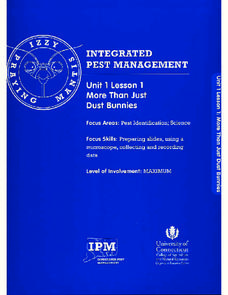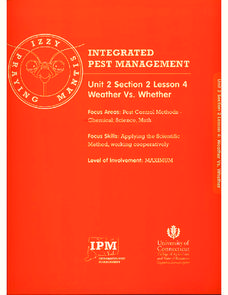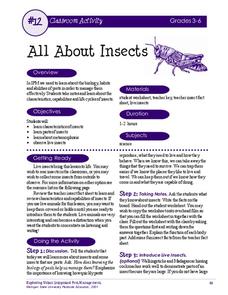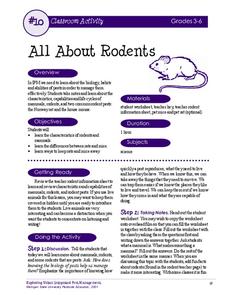Howard Hughes Medical Institute
Tracking Genetically Modified Mosquitoes
What's that buzzing in your ear? An insightful lesson about genetically modified mosquitoes! Partnered pupils explore the creation, release, and monitoring of mosquitoes designed to reduce the mosquito population. After watching a video,...
Cornell University
Field Day: Be an IPM Detective
Become a pest detective! Individually or in small groups, scholars scout the land to discover which pests—plant and animal—inhabit it, determine whether the pests are endangering the environment, and summarize their findings.
Cornell University
Weed IPM
Go on a weed hunt! Scholars gain insight into the characteristics of plants and examine the outdoor environment in order to identify five different types of weeds. Learners then show what they know with a one-page reflection.
Cornell University
Insect IPM
Find out the characteristics that makes a bug an insect with a workbook designed to inform scholars about the crawly creatures that live around us. Scholars complete an ant-themed word search, answer questions using a solution key, and...
Cornell University
What is IPM?
Discover what a pest is and how to identify one with a lesson that looks closely at our outside world and taxonomy. Scholars investigate insects and plants to practice their identification skills, take a survey, and explore the...
University of Connecticut
More Than Just Dust Bunnies
Teenagers will never complain about cleaning their rooms after this activity. In the first lesson plan of a four-part series, budding scientists collect samples of dust, chalk, and other particulates from various areas of the classroom....
University of Connecticut
Weather Vs. Whether
Monarch butterfly populations have decreased by 90 percent over the past 20 years due to misuse and ineffectiveness of some pesticides. Given the challenge to increase pesticide safety and effectiveness, the class, through discussion,...
Michigan State University
All About Insects
Insects are the focus of an activity that looks deep into the anatomy and metamorphosis of everyday bugs. Two worksheets reinforce knowledge obtained through a teacher-guided grand conversation and insect observation.
Michigan State University
Preferred Destinations
Pests vacation, too! Here, scholars create travel brochures or posters that inform others about a habitat in which a pest lives. Travel information to be included contains everything from pictures to resort names to slogans down to the...
Cornell University
Wasps and Ladybugs
Can a good bug ever become a bad bug? An elementary entomology resource explores what to do when too many ladybugs or too many bees are in your home and can become a problem.
Michigan State University
All About Rodents
Get to the know the common house mouse and the Norway rat with an activity that reinforces reading comprehension skills. Scholars read a three-page document detailing key information about mammals, specifically rodents, and use their...
Michigan State University
In Search of Life
Explore the habitats around you with an activity that takes kids out of the classroom to learn about the local variety of habitats and the living things that call them home. In small groups, scholars investigate their surroundings,...
Michigan State University
Create an Animal
Think beyond the animals and habitats we've already discovered and allow scholars to dream up their very own habitat and an animal that lives there. Class members present the new habitat and animal on a poster alongside an...
Michigan State University
Friend or Foe?
What one person thinks is a pest may not be a pest to someone else. Here, scholars examine the characteristics of living things and pests through grand conversation and a variety of activities. Class members play a game of pest or not a...
Cornell University
Let’s Raise Lacewings
Young entomologists explored beneficial insects and how they help control pests in the first lesson of the series. Now class members take a close look at the lacewing, which is a beneficial insect.
Michigan State University
May I Take Your Order?
If you're a pest, come and get a tasty meal here! Scholars work collaboratively to construct a mini restaurant out of a shoe box and create a menu that feeds a pest their favorite food.
Michigan State University
Inspecting The School
Keep your eyes peeled for pests! Here, scholars inspect their campus for signs of living things such as insects and rodents. Upon observation, class members record their findings and present the information to their peers.
Michigan State University
Wanted Dead or Alive
Wanted! Pests are on the loose! Here, class members create a wanted poster highlighting one pest. Posters includes a picture, description, and signs of pest activity.
Michigan State University
Interviewing
Do you have pests at your school? Find out through a series of interviews with school personnel. Scholars visit a variety of knowledgable individuals to ask them questions, record their answers, and present their findings to their peers.
Michigan State University
What is IPM?
Learners view a plastic cockroach, mouse, or picture of a pest and discuss if they belong inside the house or school. They discuss what a pest is and brainstorm what makes it a pest and ways to get rid of them. They then discover dangers...
Michigan State University
Biological Control
Student determine how to manage pests using biological control. They examine how knowledge of the pest's food chain is helpful in managing pests. Finally, they identify the three groups of biological control agents. They listen, take...
Curated OER
Organic Farming / Agriculture
Want an organic farming resource packed with experiments, background information, science fair projects, and topics of interest for further research? Here it is. Young environmental scientists can explore concepts involved in organic...
Curated OER
Integrated Pest Management
Students investigate the different methods used in integrated pest management. In this biology lesson, students evaluate experiments and case studies on IPM. They discuss the pros and cons of using this method.
Curated OER
Mouthpart Madness
Students explore the basic biology of a pest. They identify the four major kinds of insect mouthparts and explain how they work. Students examine the specific mouthparts and how they can limit food resources and in what environment an...

























